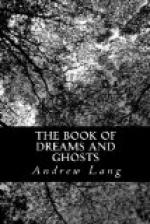Thus the doctrine of telepathy puts a ghost of the dead in a great quandary. If he communicates no verifiable information, he may be explained as a mere empty illusion. If he does yield fresh information, and if that is known to any living mind, he and his intelligence may have been wired on from that mind. His only chance is to communicate facts which are proved to be true, facts which nobody living knew before. Now it is next to impossible to demonstrate that the facts communicated were absolutely unknown to everybody.
Far, however, from conveying unknown intelligence, most ghosts convey none at all, and appear to have no purpose whatever.
It will be observed that there was no traceable reason why the girl with a scar should appear to Mr. G., or the soldier and suppliant to Mrs. M., or Lieutenant B. to General Barker. The appearances came in a vague, casual, aimless way, just as the living and healthy clergyman appeared to the diplomatist. On St. Augustine’s theory the dead persons who appeared may have known no more about the matter than did the living clergyman. It is not even necessary to suppose that the dead man was dreaming about the living person to whom, or about the place in which, he appeared. But on the analogy of the tales in which a dream or thought of the living seems to produce a hallucination of their presence in the minds of other and distant living people, so a dream of the dead may (it is urged) have a similar effect if “in that sleep of death such dreams may come”. The idea occurred to Shakespeare! In any case the ghosts of our stories hitherto have been so aimless and purposeless as to resemble what we might imagine a dead man’s dream to be.
This view of the case (that a “ghost” may be a reflection of a dead man’s dream) will become less difficult to understand if we ask ourselves what natural thing most resembles the common idea of a ghost. You are reading alone at night, let us say, the door opens and a human figure glides into the room. To you it pays no manner of attention; it does not answer if you speak; it may trifle with some object in the chamber and then steal quietly out again.
It is the House-maid walking in her Sleep.




